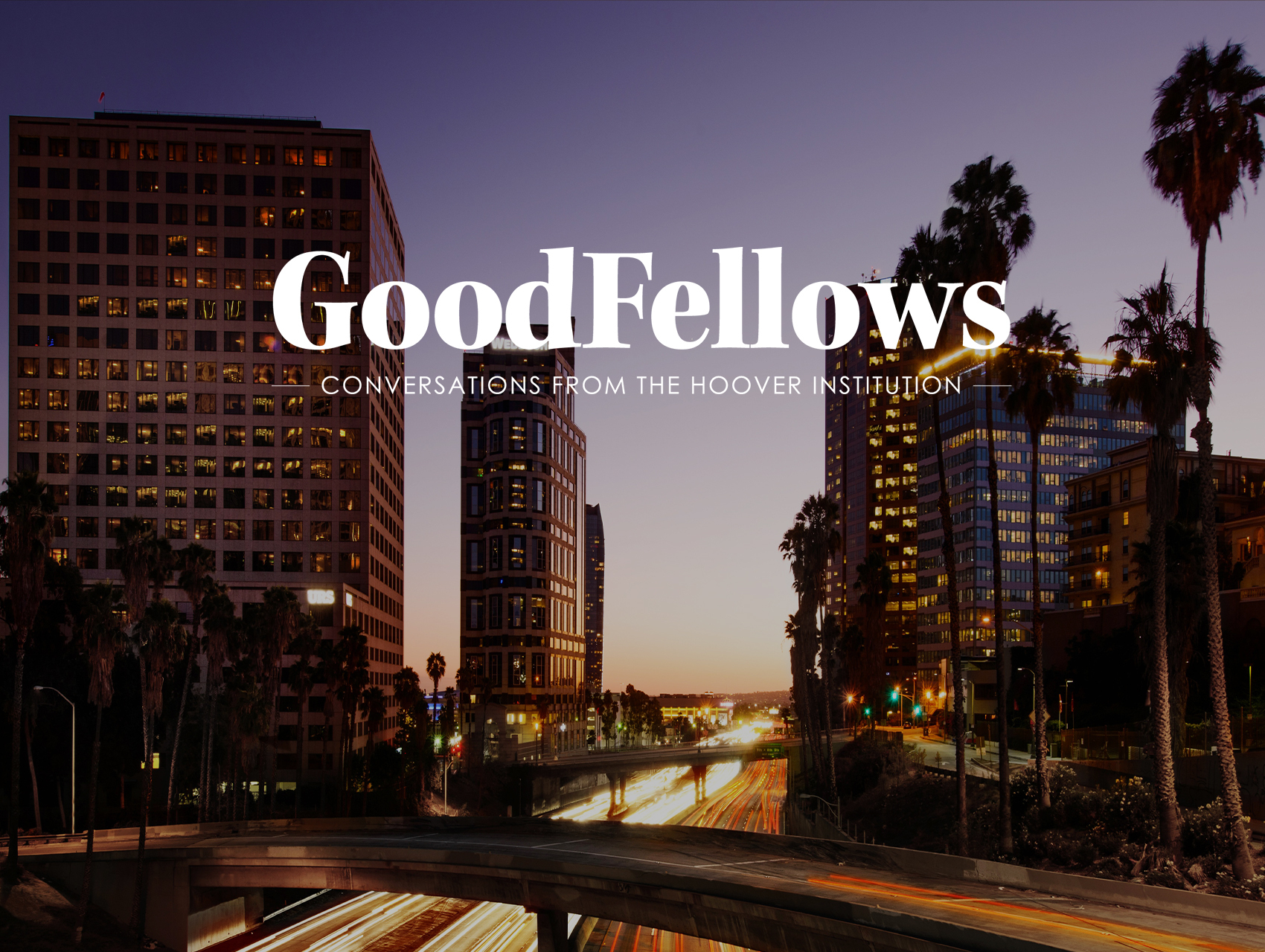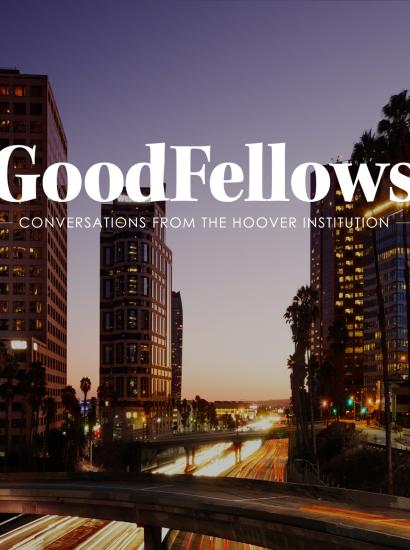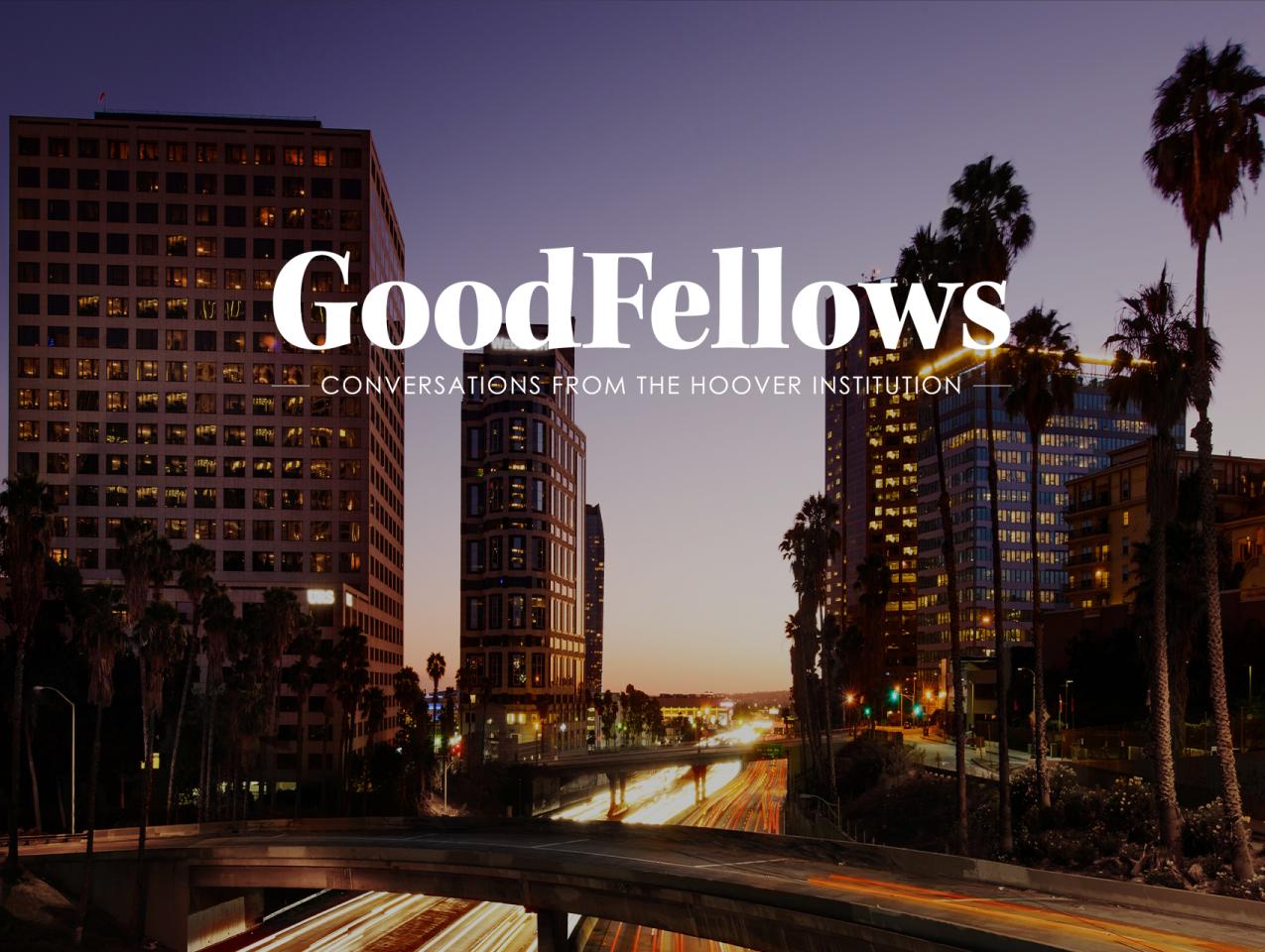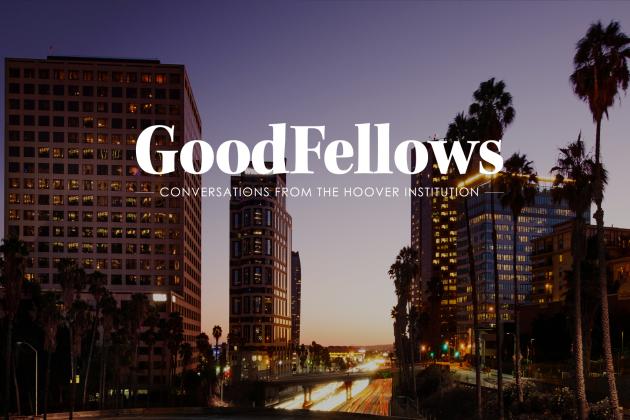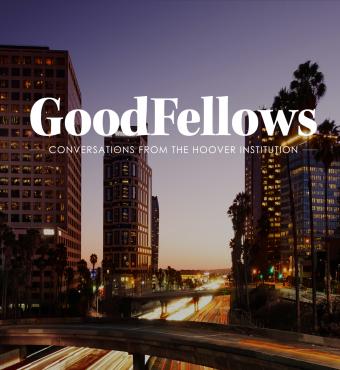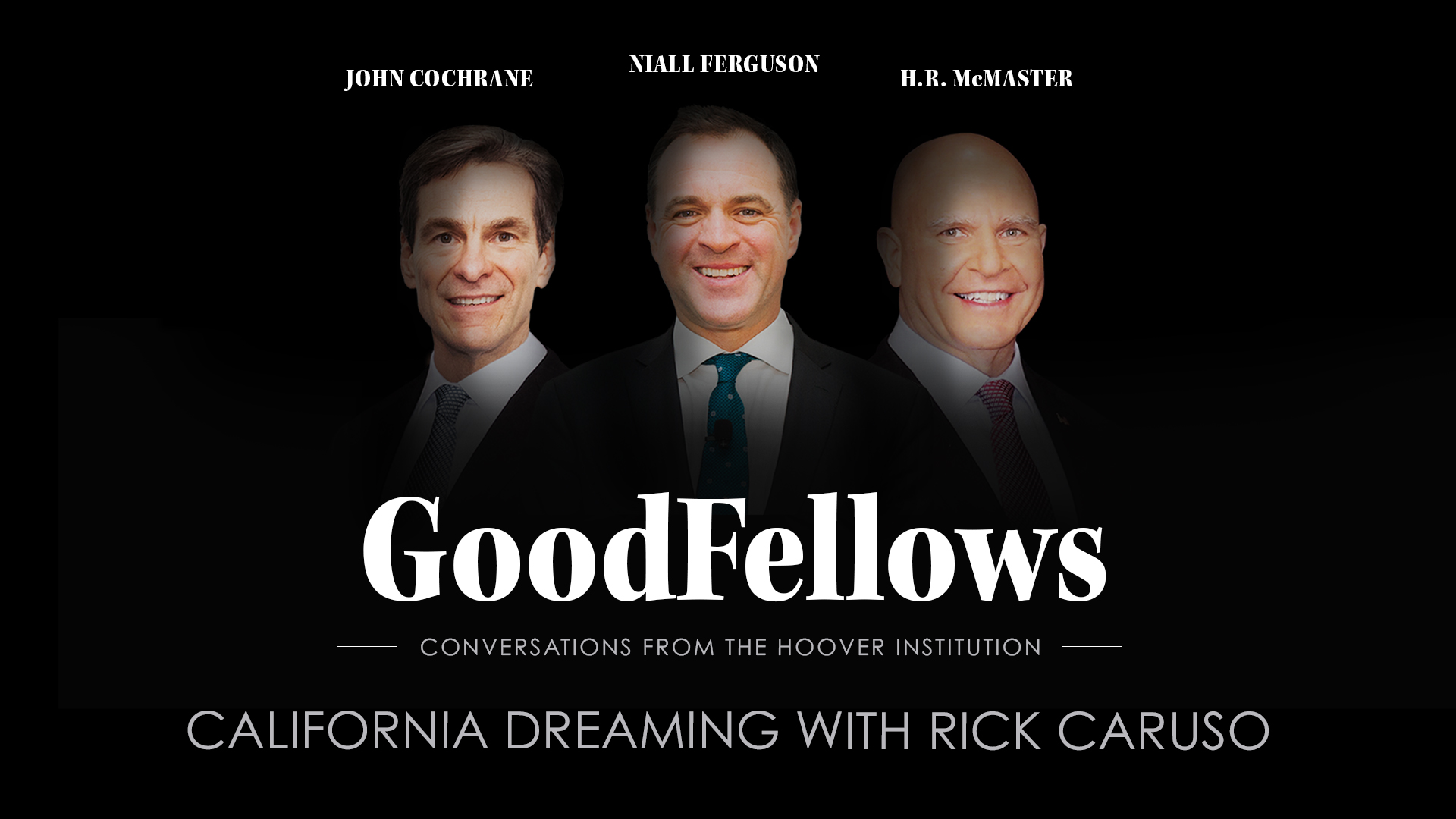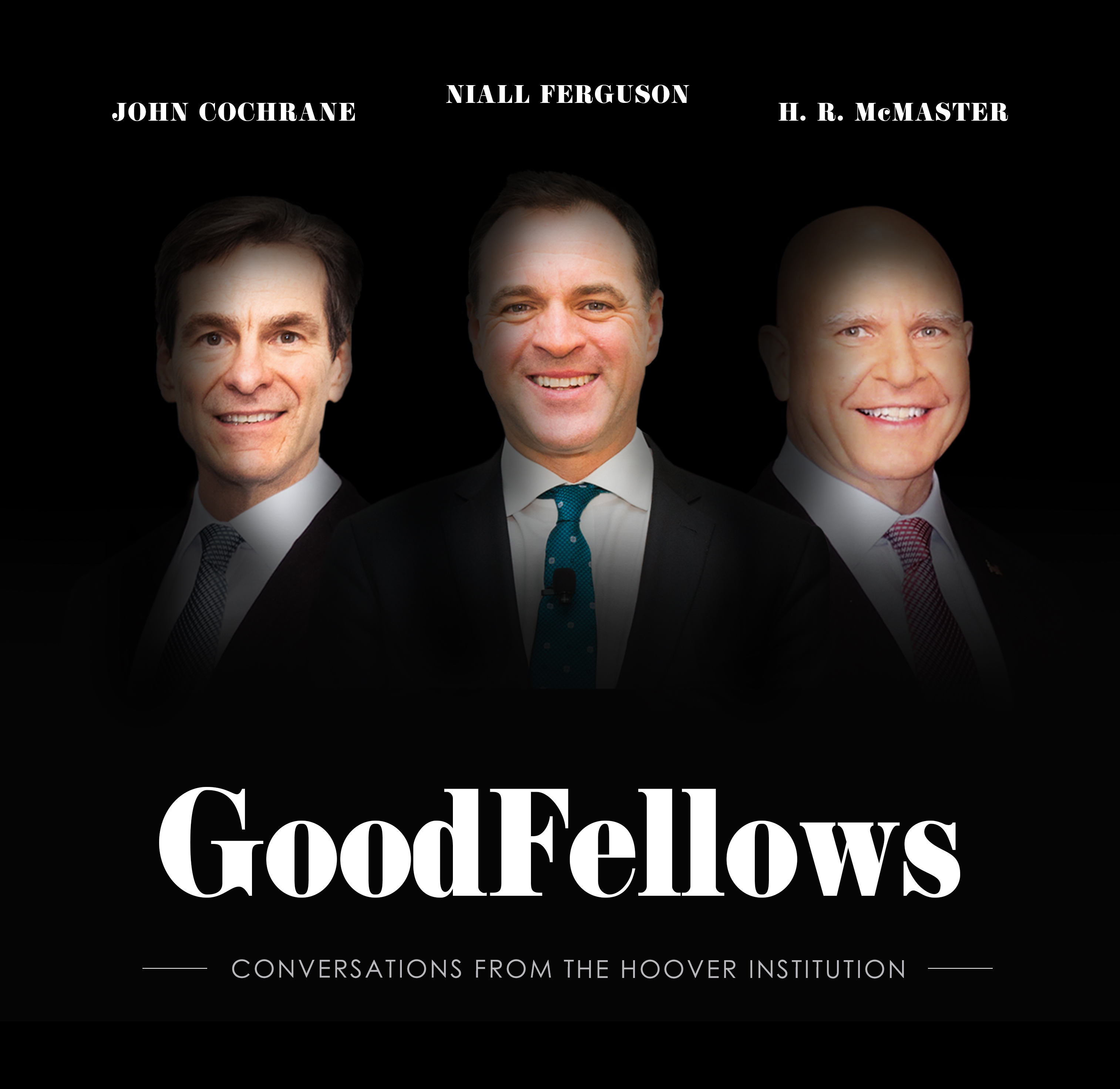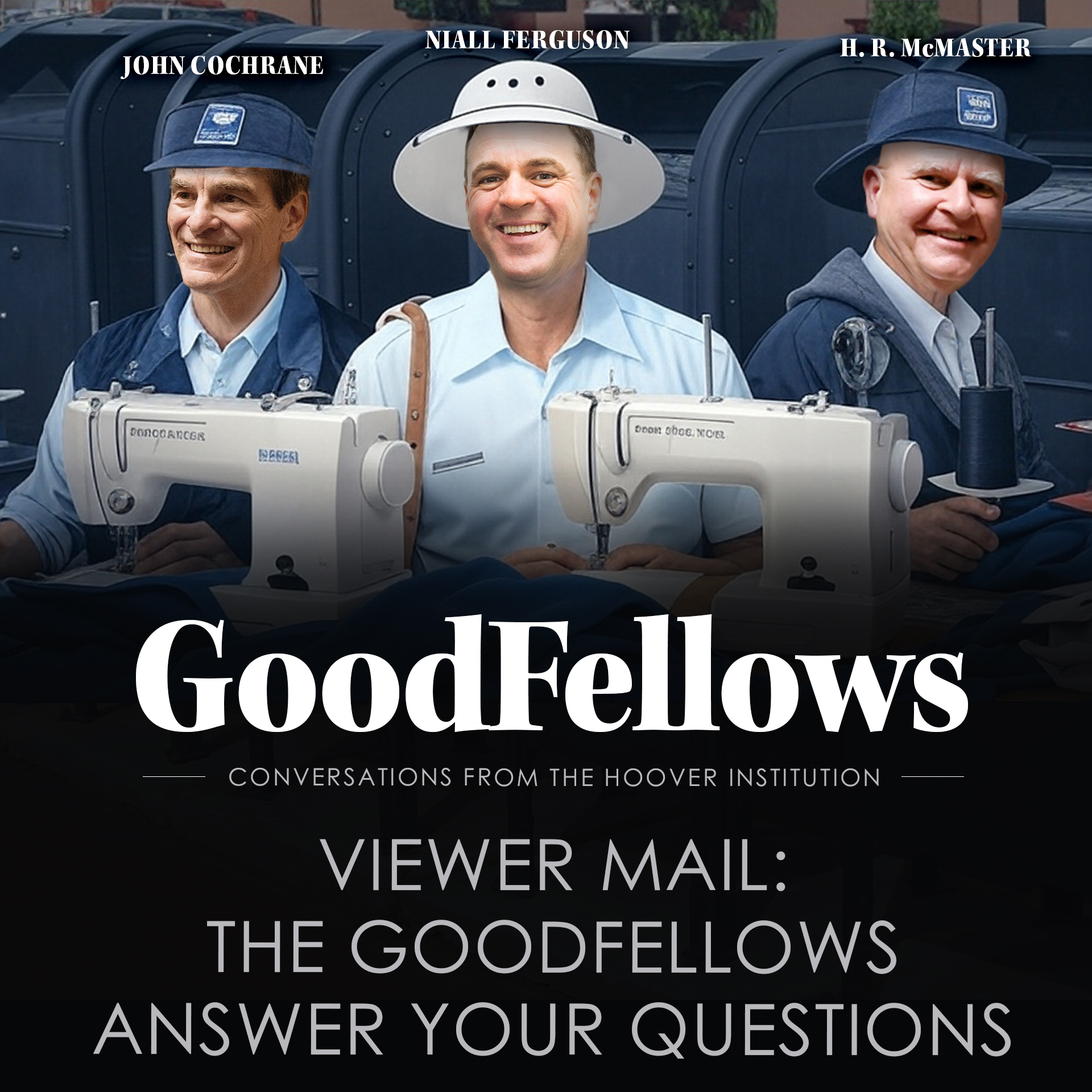- California
- Empowering State and Local Governance
In contrast to the 20th-century bosses of industry who ran America’s big cities, New York City seems poised to elect an unabashed socialist with dreams of government-run bodegas, rent freezes, and wealth redistribution. Rick Caruso, noted Los Angeles real estate developer and possible political candidate in 2026, joins GoodFellows regulars and Hoover senior fellows Niall Ferguson, John Cochrane, and H.R. McMaster to discuss the future of America’s big cities—whether his other major cities will follow Gotham’s lead, plus how to bring needed change to municipalities notoriously averse to innovation (and in LA’s case, a city perhaps unprepared for the 2028 Summer Olympics).
The three fellows next reflect on the Ukraine-Russia conflict, now entering its 42nd month with no end in sight, then engage in a “lightning round” that touches on Harvard’s reported desire to create a Hoover Institution of its own; Hunter Biden’s skewed take on illegal immigration; the Epstein scandal’s effect on the MAGA movement; plus a “heated” debate over why Sir Niall and his countrymen choose to live without air conditioning.
Recorded on July 22, 2025.
>> Rick Caruso: Career politicians have making excuses down to a fart and trying to explain why there wasn't water. Nobody wants to excuse why they lost their home, why they lost their business. The reality is they were not prepared. The reality is we all got the warnings of disastrous, catastrophic winds that could kill people that were issued.
And the preparation just wasn't right. It wasn't enough. And this malarkey about fire hydrants are intended for homes and not for wildfires like this. My God, what an excuse to make. And this is a region that has a history of fires. So it wasn't breaking news that there may be a fire here.
And because of the negligence of our government leaders and our government officials, we have the Santa Monica Mountains. The density of that brush was fuel just waiting to explode. And that's when it did.
[MUSIC]
>> Bill Whalen: It's Tuesday, July 22nd, 2025. And welcome back to Goodfellows, a Hoover Institution broadcast examining social, economic, political, and geopolitical concerns. I'm Bill Whalen. I'm a Hoover Distinguished Policy Fellow, and I'll be your moderator today. I have good news to report. We have a full complement of good fellows in the House.
That includes, of course, the historian Sir Niall Ferguson, economist John Cochrane, and former presidential national security advisor, geostrategist, and bestselling author, Lieutenant-General H.R. McMaster. Gentlemen, good to see you. I hope your summers are going well. So we have two topics to address today. We're going to talk about the war in Ukraine, which has now reached its 41-month mark, incredibly enough.
But first, we're going to talk about the state of big cities in America. I know something John Cochrane is particularly willing to get into, but gets into all interesting questions about despondency and really how to run a city and so forth. And joining us for the conversation is Rick Caruso.
Rick Caruso is the founder and executive chairman of Caruso, one of the largest privately held real estate companies in the United States. In 2022, Mr. Caruso was the runner up in Los Angeles's mayoral election. Rumor has he may run again. Maybe he'll share his plans with us. We can ask, but we thought he'd be the ideal guest today.
He sheds some light on what's going on in America's big cities, choices voters are making, plus the question of how to end such chronic dysfunctions, homelessness, bad outcomes in public education, and in the case of Rick Caruso's beloved Los Angeles, his city's terrible response to wildfires early this year.
Rick Caruso, welcome to Goodfellows.
>> Rick Caruso: Well, thank you for having me. Appreciate it.
>> Bill Whalen: One thing I forgot to mention in the introduction is that you count among your neighbors one H.R. McMaster. So I have to ask you, as somebody who knows real estate better than all of us combined, when a rapscallion like H.R. McMaster moves into the neighborhood, what happens to property value?
>> Rick Caruso: Massive increase in property values. Tina and I have benefited mightily from he and Katie living next to us and the family. So we've refinanced our house five times.
>> H.R. McMaster: Hey Rick, great to see you. Great. Thanks for being with us.
>> Rick Caruso: Good seeing each side now. He's one of the all time great family, great neighbors.
We miss him though, we gotta get you back down there.
>> Bill Whalen: So Rick, I have to ask you, since I'm an aging boomer, I recall an America in which America's big city mayors were, shall we say, rough cut customers, a blue collar appeal, tough on crime, no nonsense.
I'm thinking about Richard Daly and John Cochrane's beloved Chicago, Frank Rizzo and HR's beloved Philadelphia. I wonder if Niall, if London's had any characters like this. But the times have changed and so have the mayors. Your city, Los Angeles is run by Karen Bass, who is a former community organizer.
John, Chicago is now run by also a former community organizer by way of the local teachers union and New York City, one of the most important cities in the world. We would agree it is on the verge of electing a 33 year old socialist who believes in such things as government run grocery stores, free bus service to all rent freezes.
And he recently said I meet the press and I quote, I don't believe we should have billionaires. So Rick Caruso, is this the way of the future for America?
>> Rick Caruso: Well, I don't think it's the way of the future for America, but obviously there has been a sympathetic tone by many of the voters and these people are resonating.
What you're seeing in New York, it's resonating for a reason. And it's resonating because of the state of New York and the high cost of living in New York. But it's also because of who he's running against, which we have to be very cognizant of. And so, New Yorkers are looking for a change.
And this gentleman represents change. Now I will tell you that I don't think any of these big cities, whether It's San Francisco, LA or Chicago have gotten into trouble because of one mayor alone. There's been a bit of a history of electing people not on competence but on ideology.
And I'm hoping that we've hit a turning point in that we see it in San Francisco with Dan Lurie. He's doing a lot of good things. The city is really starting to turn around. Obviously a lot more needs to be done. I think LA is a little bit behind San Francisco in that regard.
But you know, a lot of people have commented to me that people went to sleep on January 6 as a Liberal and woke up as a conservative on January 7th when the fire started. It really was a big wake up call and an alarm that competence does matter in leadership.
So I'm hoping that there's that sort of catches on across the country. We'll see.
>> Bill Whalen: Okay, John, have at.
>> John Cochrane: Well, I mean, let's just start with the political. You mentioned voters, but of course, who's winning here is a coalition of people with luxury beliefs and some unions and other organizations feeding at the trough, actual, poor people in cities want better schools.
They want the cops to come, not to defund the police, they want actual services. So I hope competence can also reach for them as well. But there's a list of priorities amid the dysfunction. I know rebuilding is big on your agenda, which raises the question of the horrendous zoning and other impediments to building in cities.
Why is the cost of housing so high? It's about supply, which I'm glad to see that the, the YIMBYs on the left are finally discovering. But then the schools are a catastrophe again, particularly hurting the least disadvantage, crime and bad behavior. Homelessness, which isn't about homelessness, it's about people's behavior in public spaces.
Where do you start?
>> Rick Caruso: I can chime in on that, though. I agree with all of that, John, but every one of those issues that you talked about can be tackled and are solvable.
>> John Cochrane: Yeah.
>> Rick Caruso: The underpinning of this though is that for a long, long time there has been a very vocal, whether it's a minority or not, of people have gone to vote to push an ideology because of a frustration that they're seeing, whatever that case may be.
We saw it over the last couple of years with the protest going on on college campuses. Most of those people had no idea what they were protesting about, but they were protesting against a system that they felt was oppressing them. And I think this is what we're seeing in New York.
What's wild about New York, when you look at the polling, the majority of the voters that came out who are black are supporting them. The majority of the young people are supporting them. The majority of the Jewish community is supporting them. And so, that's just wild to think about, given what he's talking about.
And so what I do really hope is that the majority of people who are in the middle who want really common sense kind of solutions to crime and homelessness and all of the things, schools, whatever the case may be. Actually get out and vote because that's what's going to change the system, in my opinion.
>> John Cochrane: Well, you need, and you also mentioned a good alternative and this was, what happened in New York was kind of a chaos of a one party city and a very poor candidate as the alternative in Cuomo and so very telegenic, extreme person can win that primary and then boy Republican in New York, good luck winning the general election.
>> Rick Caruso: That's right, that's right.
>> Niall Ferguson: Rick, can I ask a question? You mentioned Dan Lurie and I must say I begun to despair of San Francisco's future and it's the city nearest to us at Hoover. But I'm pretty impressed at what's happened since his election and I wondered what your take was.
In a way he's the kind of moderate centrist Democrat coming in to clean up the mess the progressives have made. Is that what LA needs or do you think LA needs something more radical?
>> Rick Caruso: No, I don't think it needs a more radical. I always think, and I think Dan is doing a really good job, it, it goes back to my theory, whether or not it's accurate or not.
But I think Dan's proving it out. It's like when you're on a ship and you change the direction by one degree over a distance. It's a dramatic change and, and Dan has really taken some relatively small steps, but he's moving the needle and he's creating this flywheel that's starting to catch momentum and bringing people back in.
Now one of the great advantages that Dan has that I don't think we have in LA is that he's got an industry, the tech industry, that's going to help repopulate that downtown. We don't have that business in our downtown to really be driving that. Here's the scary part about downtown LA.
We have almost a 40% vacancy rate in downtown LA now. And it's not about back to work rules because Century city, which is 30 minutes away, is about 100% lease with the highest rents in the country. And that's because it's clean, it's safe. All of these kind of things that are just basic things that you need in order to bring, bring people back to work.
But I think Dan is making some good changes. He's got some big challenges. I talked to Dan, like la, he's got a billion dollar deficit that he's got to figure out. He's got a complicated governance structure with the county and the city being together. But nonetheless he's bringing back A lot of optimism and that's really critical that people are starting to say, I think this is going to work.
Let's go back and take a look at San Francisco for headquarters, for retail, for opening up a restaurant, etc. So I'm optimistic that we can do the same thing in LA with a moderate common sense. I don't care if you're a Democrat or an independent, whatever the case is, but somebody who has some experience and competence and is going to make some tough choices to move the needle.
>> H.R. McMaster: Hey Rick, you know, you mentioned the critical role of the private sector in invigorating urban areas. You mentioned also how the fires kind of alerted everybody to the gross incompetence of city leadership and policies, as you mentioned, over multiple administrations. Would you mind summarizing for our listeners?
I know you've done this in the past what the wildfires exposed, but then also how you're galvanizing the private sector to rebuild a community. Because this is what's been striking to me is, Kai, you've been driven not just to rebuild, right? But to rebuild a sense of community.
>> Rick Caruso: Well, thanks for the question. What it exposed at every level in the city is the incompetence, starting with the mayor not being prepared, not having a plan, having the bad judgment to lead town. And as recently of last week repeated that she did not know that these extreme winds were coming, which is an impossibility given the amount of warnings that came on everybody's iPhone, that they were catastrophic, quote, unquote, catastrophic, life threatening winds.
And she also repeated when asked on a podcast why the fire department wasn't pre deployed, she said it's quote, unquote, a mystery to her. So that just shows the level of disengagement and incompetence. But as we all know, and as you know, in your roles, everything starts from the top.
Then you have a head of Department of Water and Power that had the terrible decision to leave the main tank empty, 7 million gallons of water. So when we got word that my daughter's house was on fire, we were also told the reason it's on fire is because the firefighters had no water in the hydrants and they can't put out the homes in that neighborhood, which in today's world just seems like an impossibility when I got that call.
So the leadership failed, the people that she had appointed in key positions were not competent and the system failed. And there obviously was not a plan to deal with this fire because it could have been Put out very quickly. Had there been pre deployment, there had been a fire there two weeks before.
They know the risk. Everybody knows the risk. When the Santa Ana winds come up and we were all warned of the risk, we were prepared. So we had the same warnings. We had a private fire department that was immediately put on site two days ahead of time. Our own water tankers and retardant.
And not only did we save our property, but we saved the whole block around us. So what's remaining in the Palisades is literally the area that we were able to save. And we started loaning equipment to the fire department. And if you go back some years, HR and I talked about this in the campaign, I posted about it.
The fire department has been so underfunded for so long by the mayors and the city that they had a whole graveyard of equipment mothballed because they didn't have the money to have them operating. I mean, it was just sin after sin after sin. So what I did, this devastation between Altadena, Malibu and the Palisades.
And if you haven't seen it with your own eyes, you really need to because pictures don't do it justice. It's the size of two Manhattans completely burned to the ground. Pacific Palisades alone is 300,000 acres that's been burned to the ground. Schools, synagogues, parks, homes. Same In Altadena, about 700 homes in Malibu.
So I put together a group called Steadfast LA. It's a non profit and I called upon people who are the best in their industries to join a board and to give their time and their talent. And the goal is to support the city, the county, the state, take problems, put the team around the problem, solve the problems and deliver a package to the city and the county and the state that they can employ to move things along, do it with urgency, do it with innovation, and do it at no cost to the city or the county.
So we're absorbing all the costs and we've been very successful. It's been great. Because what we know from past disasters is these things are too big for any government alone to handle, even if you had a government that was highly efficient. So we're pushing on this. We've got a team of people at Steadfast that are dedicated full time.
We're rebuilding parks, we're helping rebuild the schools. We developed an AI model to plan check people's homes in a matter of hours rather than months. That it was taking the city and the county and we're starting to do the same thing. As my goal has been to create this flywheel that you start getting this energy behind it.
Because the one thing all of these people need is hope that their community is going to come back. And I think the city and the county more than anything needs to have this culture and this attitude that says, we are with you. We are going to be a good servant of the people, stand behind you.
We want you to come back. We know that takes time and money, and we're going to have your back. We got your back, folks. And that's the kind of messaging I think we need to see. And we need to get more people rebuilding, which I think we will.
>> John Cochrane: And for the rest of the city, too. You're rebuilding the Palisades. And once you got your AI plan checking, maybe we could AI plan check everybody else around the city who wants to rebuild. The city's [CROSSTALK] Is basically to say no, [LAUGH] To say, here's all the obstacles.
No, you can't build this. No, you can't build that. How about a city that says yes for a change? It's interesting because it's not something new. It's just basic competence. It stops shooting yourself in the foot.
>> Rick Caruso: Of course, John, and our motto at Steadfast is we're going to work with the elected officials.
We're going to work around the elected officials, or we're going to work through the elected officials. But we're going, and if you want to come with us, great. And I've lifted the old Dick Reardon line when he was mayor. Ask for forgiveness and not permission. And we're doing a lot of that.
But I gotta tell you something, the energy is contagious and we're planning on reopening our village next year. The amount of restaurants and retailers that want to come back is inspiring. People want to be part of a story that says good is going to happen and it can happen.
And I'm just really grateful that I'm living in that moment that we can be part of that.
>> Niall Ferguson: Rick, you mentioned Reardan and I know Dan Lurie mentions Mike Bloomberg as a kind of role model. It's good to be reminded that it's not that long ago that cities were well run.
We don't have to go as back as Bill did earlier. Do you have a role model, somebody you think of as the kind of model mayor?
>> Rick Caruso: I served for three under three mayors. I served under Tom Bradley when I was in my 20s. I served under Dick Reardon and I served under Jim Hahn.
I Saw three different leaders, and all of them were exceptional. And I love Dick Reardon. He was also a very close personal friend. But I want to tell you, the unsung hero that I learned a lot from was Jim Hahn. He wanted me to be, which I accepted, the president of Police Commission.
And when I was the commissioner, police commissioner in LA, I had a very difficult job of having to fire a very, very popular black chief of police, Bernie Parks, because he was not doing his job. And crime was skyrocketing, obviously very popular in the black community and around the city.
And then what did I do? I went and hired a guy that wasn't from LAPD and wasn't from Los Angeles, this guy named Bill Bratton, who, with this funny accent, and it was like sacrilege. And I called Jim Hahn and I said, Jim, this is what I'm going to do because it's the right thing for the city.
And Jim, to his credit, said, just do the right thing. And the message there was, don't worry about getting reelected or reappointed. And if you don't worry about getting reelected or reappointed, you can really make a difference. And that's what we've got to bring back. And Jim supported my decision and then lost his reelection because the black community turned against him.
And that's when Antonio Villarrigosa became mayor. And in my opinion, the downhill slide started in LA.
>> Bill Whalen: Speaking of Mr. Villaragoza, he is thinking about running for governor. So if you don't mind me asking you a personal question, why are you concentrating on Los Angeles when there is a larger dysfunctional thing called the State of California that sorely needs leadership?
>> Rick Caruso: I'm looking at both. I mean, I am looking at both.
>> Bill Whalen: We made news.
>> Rick Caruso: I'm spending a lot of time up in Northern California and enjoying that, meeting a lot of great people up there. And listen, California's got a lot of real challenges. There's no doubt about it.
And again, I believe fixable. And I'm going to make a decision at some point, at the end of summer and decide if I'm going to focus on a mayor's race and try to help the city I love, help the state I love or remain a. A private citizen.
But I am optimistic. I mean, California should be leading this country. It has the ability to do it. We've got the most talented people, the greatest educators, some of the greatest universities in the world. I mean, you go on and on and on. And in spite of the way it's been run with the fourth largest economy in the.
In the world. But we also have some of the highest poverty in the world.
>> Bill Whalen: Right.
>> Rick Caruso: We have the highest rate of homelessness in the world. I mean, we've got some things that we can't be proud of that we gotta fix. So I'm looking at both. I'm gonna consult HR and he'll tell me the right thing to do.
>> H.R. McMaster: Yeah, well, I'm just grateful for yours and your family's willingness to serve. Right. I mean, Rick, could you maybe share with us how you thought about it before you ran? Because it's a gauntlet, right? And people are vicious. You've got the advent of social media and how that has become created even a more vitriolic discourse.
But, from my perspective, I think you transcended it. So maybe will you talk about what motivated you and your family to serve? But then also the approach you took during the campaign. I think for our viewers, they ought to check out the debate you had with Karen Bass.
>> Karen Bass: I'm not doing political stuff. You know, what if people are dying on our streets and it is necessary. I might do that because it was a model of civility, you know, and.
>> H.R. McMaster: And so you ran in a way where you didn't get dragged down into it.
You transcended it.
>> Rick Caruso: I thought, well that's probably. That's probably the way I was raised. I can give my parents and my grandparents credit for all of those kind of things, but. And I appreciate that, HR Listen, I ran for a very simple reason. I raised my family in LA.
I built my business in LA. LA gave me everything. You know, I posted a couple of days ago, there was a little bit story about my grandfather being an immigrant from Italy and landing in Boyle Heights, and as a young kid, going on rounds with him around the city.
He was the gardener. And it really developed my love for the city and also my love for plants and everything else. But the frustration that I had that led me to run is that I know you can solve the homeless problem. I know you can solve the crime problem.
I did many of these things when I served for three mayors, and I saw great movement being done where this city was really growing in a magical way. And I also saw it slide back, and I didn't want that to happen again. We're seeing it in Los Angeles here.
I mean, the crime is really a problem in Los Angeles. A buddy of mine this morning called me. Hancock park, actually, right near the mayor's residence. Someone got beat up this morning. Just going for a walk. This is a very wealthy, nice community. The police never showed up.
The police department is completely stretched to the limit. So that was my fuel and my concern was exposing the family to that. How would all that play out? And the safety of the family. And HR knows the family, God love them. I mean, they all stepped up and they got on the streets and they campaigned with me.
And we were going into neighborhoods and talking to people that had been long forgotten by the leadership of the city. And people were hugging the kids and hugging my wife. And I would tell them that hug represents hope. Were giving people hope. And it was the most rewarding experience of my life.
I didn't, I didn't like the way it ended, but the journey was fantastic. And I think the advantage that I had and if I ran again, I would have. I'm not looking for a career. I am literally looking to just come in, help make some changes and step back.
And it may be a four year stint. I don't even think about doing it for eight years. And listen, I hope that there is an opportunity that plays out for me because how lucky is that that you can lean in, help a whole bunch of people, and then go back to your private life and feel good that you made a bit of a difference in your community.
>> Niall Ferguson: Can I raise one quick question, which is almost a psychoanalysis question? You've brought up the possibility of a run for governor. I look at Gavin News and I see a man driven by immense political ambition. But why, if you're as ambitious as him, would you make such an epic mess of being governor?
How can you explain this disconnect? It seems like if you wanted to do as much possible as to make yourself unelectable in all the other states, you couldn't really do more than he's done in California. I can't understand what would lead to these decisions and the mistakes that have created all the problems we know about in California.
Can you explain it to me? Because it's a puzzle.
>> Rick Caruso: [LAUGH] I'm not sure I could explain that one to you, I could explain it in general. This is what I think. In general, people are too worried about getting reelected. And so when he looks at his base or any elected official looks at their base, they, they're trying to satisfy their base.
I mean, it happens on the right, it happens on the left. You see it both. I'm hoping, quite frankly, that people are tired of extremes both on the right and the left. And let's get back to the middle. It's sort of like being in a football field stand on the 50 and be able to reach out to the 30 yard line on each side and bring people together.
And I think the great leaders that we've seen have done that, but that takes courage. Because you know what, you might not get reelected. And God forbid for most of these people, they might have to get a real job. Most of them have never, they've never signed the front of a check.
They've only signed the back of a check.
>> John Cochrane: But it's not just about the middle and policy and reaching out and common sense. You have to fight some extraordinarily entrenched interests who benefit off the current dysfunction. You want to clean up real estate? Well, there's a whole zoning code.
You can't just say, go, build. You have the zoning, the planning office. You had all the NIMBY forces that want to use the existing laws to stop anything from happening. You want to clean up the schools, you know, well, it's been shown that it's fairly straightforward to do, but you got a whole teacher's union who is, you know, legally enshrined in many ways to stop you from doing what you want to do.
And that's just two of a hundred examples. So how do you fight against the very strong interests and the legal system they have a hold of that are there to stop the kind of things you want to do to make it better?
>> Rick Caruso: It's very tough. It's a tough job, but it's a job worth doing.
And that's what leadership is all about. I mean, any of you given an assignment, they're going to be tough assignments. That's why you're all well renowned and successful. If you took easy assignments, nobody would know who you are. And I think that's what's motivating, is figuring out how to break this apart and put it back together.
And I've had fun in my life doing that. The assignment of rebuilding LAPD, everybody said it couldn't be done. We got crime down to levels not seen since 1950. We just completely changed the rules of the road for lapd. You look at what I did at usc, we were in the worst mess in the history of that university because of the leadership problems.
Completely changed the governance structure. So it can be done. Is it easy to do? No, it's not easy to do. But, my God, when you get through it, it's incredibly rewarding. But you've got to be able to compromise. You gotta be able to negotiate, you gotta be fair, you gotta be practical.
But you've got to be setting a goal and getting everybody to sort of walk with you down that road together. So I think it's doable, John, I really do. Otherwise, if it's not doable, you just get to close up these cities. They're going to implode on themselves.
>> Bill Whalen: We're running out of time.
But I would like to ask you one question before we go, Rick, going back to my premise is an aging boomer. I remember the world came to Los Angeles in the summer of 1984. And, boy, did Peter Uberath and company put on a great show. The question to you, sir, is this, the Summer Olympics kick off in LA on July 14, 2028.
We're now within three years of that. How confident are you that Los Angeles is going to pull this off?
>> Rick Caruso: Not very.
>> Bill Whalen: Why?
>> Rick Caruso: Sadly, not very. There's a gentleman named Rick Cole who just retired from the controller's office. You should take a look on YouTube and find his parting sort of farewell speech.
>> Bill Whalen: Okay, can I read you a quote from that? He said, I've never been more alarmed about the future of Los Angeles. The problem of Los Angeles government in the public sector in California is an aversion to innovation.
>> Rick Caruso: Yep, and Rick was so true on that, and his other line was, we can't figure out how to repair sidewalks, how are we gonna be ready for the Olympics?
>> Bill Whalen: Right.
>> Rick Caruso: It's going to take a massive effort. I think it can be done. I'm not sure that the leadership we currently have today is going to be able to pull it off. I'm worried about it.
>> Bill Whalen: Okay. Hate to end on a sad note, but Rick Russo, we do appreciate your time today and hope to have you back on the show and keep us informed on what you ultimately decide.
>> Rick Caruso: I love it. Thank you for having me. Really appreciate it. Thank you.
>> H.R McMaster: Thanks so much.
>> Bill Whalen: This week marks a solemn occasion. 41 months since Russian forces rolled into Ukraine and began the bloodiest war of this century. A war that some people thought might last maybe 41 days at most, not 41 months.
Let's talk about where the war stands and if there is such a thing as an off ramp and a road to peace. Sir Niall, I turn to you. Vladimir Putin is now on the clock. He has until September 2nd to react to Donald Trump's ultimatum of accept a peace deal or receive what Trump calls, quote, very severe tariffs.
Is this how you get Putin to the table?
>> Niall Ferguson: No, it's not. Part of the problem is that President Trump's deadlines, as we see in the trade negotiations generally, are somewhat fluid. But the main problem is that he's not applying the kind of pressure that might seriously change President Putin's calculus.
Look, I defer to HR in all military matters, but I spend a lot of time trying to keep informed about this war. The Russians are grinding out victory. That's the harsh reality. Despite the extraordinary bravery and creativity of the Ukrainians, it's a very, very long front they're defending.
They're stretched very thin. And Russia has stepped up its air attacks on Ukrainian civilians to an unprecedented level in recent weeks. And it's more than the Ukrainian air defences can keep out, because the Trump administration has blown hot and cold about this war, periodically veering in the direction of essentially giving Russia what it said it wanted, and then at times veering in the other direction and scolding Putin.
That has, I think, created an uncertainty about the U.S. commitment. And although the Europeans, in response to pressure from President Trump have stepped up their military spending in a really quite impressive way. It will take a while, too long for that to turn into the kind of resources that can take the place of US support for Ukraine.
So I'm pessimistic. I think Putin, looking 12 months ahead, thinks that he's going to be in a stronger position than he is now, and why should he settle when he ultimately seems likely to overwhelm Ukraine? I'll make one last point, Bill, and I'd love to get HR's thoughts on this.
In all the conversations that I have about this war in Europe as well as in the us, I'm struck by how few people really visualize the nightmare scenario of the fall of Kyiv. They don't think about it. They don't see the implications. They talk about the war as if it's a stalemate, but it's not a stalemate.
I think that's something of an illusion. It's a very rapidly changing kind of war, but it's not one in an equilibrium. And the balance of forces very clearly favors Russia if the war lasts much more than six months more. HR, what do you think?
>> H.R McMaster: Hey, well, you know, I agree with almost everything you said, except I don't think Russia has the capacity to be able to sustain an offensive.
I think all they can do is what they're doing now, which is grind it out on the Western front, as you mentioned, they're making gains, but they're making gains in extraordinary cost. And, thinking back to something we spoke about, I think, a couple of episodes ago, which was the Lundorf offensive in 1917 that seemed, that was going to be successful.
But after the breakthrough, they could not sustain that offensive, it reached the culminating point. And even at a period of desperation, with the French army mutiny and everything else, the tide eventually turned. It turned with U.S. forces, right? And that's not going to happen here, but I think with US arms coming back into the picture.
And it could bolster the will of the Ukrainians. And of course, Ukrainians are continuing to develop, I think really extraordinary deep strike capabilities, with or without U.S. munitions, as we saw in Operation Spider's Web, for example. So I think that the hope for the Ukrainians is that Vladimir Putin will conclude that he can't win and that he'll begin to realize that he's losing because he can't sustain 50,000 casualties a month.
So I'm heartened by the president Backing in to this recognition that Vladimir Putin is intransigent, that he has objectives that go far beyond anything that's justifiable, which has been the case since the invasion, but that he's not going to agree to a ceasefire unless he concludes that he can't win.
So I'm hopeful, not maybe about the sanctions, but about the sustained support of weapons. The one thing that concerns me and John, I'd love to hear what you think about this and Nial too, is this kind of adoption of some of the Biden administration language about offensive and defensive weapons and what sorts of weapons will be provided, what may not be provided, because there's no such thing as an offensive weapon.
I mean, for example, long range precision strike capabilities we've mentioned many times are critical to air defense because it's important to kill the archer as well as shoot down the arrows. So I'm heartened by the sustained support. I think it's a great formula for President Trump, who always wants others to pay more.
Remember, President Trump always asks four questions, what's in it for us? Why do we care? Second question is, why do we have to do it? The third is how much does it cost? And the fourth is, can we get other people to pay for it or to pay more?
And, and so I think he went through this process. The Europeans were quite smart about this. And, and, and so I'm hopeful, I just hope that they don't try to do what the Obama White House, I mean, I'm sorry, the Biden White House tried to do, which is kind of manage the war and beat out, you know, weapons in an incremental manner.
>> John Cochrane: We are doing that a little bit, aren't we? So we're getting, we're allowing the Europeans to buy them some patriots, but being worrying about small amounts of money here, but okay, those are useful against ballistic missiles. We're not giving, letting them have long range weapons to go after the source of the problem.
Trump said don't, don't bomb Moscow. It's sort of 50 days in order to send as many drones as you can to civilian targets in Ukraine, which is pretty sad. But on the other hand, I mean, it strikes me of some of the Vietnam War mentality. I was watching that wonderful Ken Burns documentary on the plane.
Trump just wants us to go away and without costing a lot. And it's not gonna go away, It's gonna sit there and fester. Some of things I'm reading, though, things are not great in Russia Economically, things aren't great in Russia. Supply things aren't great in Russia. I mean, just the meat grinder at the front is making gains, but small gains.
There's, there's no breakthrough yet. So it does look like a situation of who collapses first and, and situ. The situation is bad enough on the Russian end that Your World War I analogy may prove out at much greater cost than need be if we would get serious about it.
But it may prevent, and I think that's what Ukraine is doing. Hang in there, lose small amounts of territory, keep killing Russian soldiers, make this a hard cost, and pray that Russia collapses first. I grant Niall will immediately say that's a terrible strategy, but it's what they've got and it's not an impossible one.
So I, I think there would be a way to do it a lot quicker. I think we all would hope for it to be done a lot quicker, but I do think it's not that necessary. And if there were any sign of a Russian breakout, Russia actually making the kind of advances it would to take over Kiev, assuming that, Ukraine doesn't collapse, but that kind of military collapse, I think all of a sudden the west might get more, much more serious about it.
So I'm not sure that an invasion to the point of invading Kyiv the way the Germans invaded, Paris, I don't think that's going to happen without at least some ramping up of support on our side.
>> Niall Ferguson: I think it's important to realize that the chance of a Russian collapse is vanishingly small.
Wang Yi, the Chinese foreign minister, told his European counterpart, we are not going to let Russia lose this war. And so China's commitment to Russia's war effort continues, and it doesn't vacillate the way our commitment to Ukraine has vacillated. That's one important difference. The other important difference is that Ukraine is a democracy, Russia is a fascist authoritarian state, and Ukraine's got its own internal political problems, which I think are going to become more of a headache as the year goes on.
There's been a fairly radical reshuffle of Zelenskyy's government in the last few weeks. But one disturbing sign is that the government is taking steps to shut down the independent anti corruption office. This is a very bad sign indeed of the way things are going in Kyiv. Now you can understand why there is intense pressure on President Zelenskyy and those close to him.
It's been a long and painful time. As Bill said right at the beginning but it doesn't send a good signal, especially to the United States, where opponents of support for Ukraine, particularly amongst Republicans, have constantly emphasized corruption as a problem. So I'm concerned that Ukraine's weaknesses are really much greater than Russia's.
And if you talk to Ukrainians, I'm supposed to be there in a couple of months. If you talk to them, they'll admit that the aerial bombardments are having an effect on. Morale, not that they're going to cause it to collapse, but just that it wears people down and that recruitment of younger Ukrainians to fight in the war is extremely difficult and conscription is unpopular.
And, there are no foreign troops that are going to come in and decide this as happened in 1918. On the contrary, there's just this huge asymmetry between Ukrainian and Russian manpower as well as between the two political systems. So I'm, of the three of us, probably the most pessimistic.
But I'll update you when I get back from Kyiv, if I get back from Kyiv.
>> H.R McMaster: Hey, Niall, let's just, I just want to pick up on something you said, which is the Chinese support. I think there's an opportunity here to, to weaken Russia from outside in by going after kind of broadly the axis of aggressors and stop the fool's errand of trying to, kind of separate Xi Jinping and Vladimir Putin and instead, kind of glue them together because China has some significant problems as well.
Also, I think what's going to happen is the administration is going to see much more clearly the connections between Iran, for example, and Russia with the provision of the shahed drones and the shahed drone factory, which Russia just put out on a, on a propaganda film between North Korea, who was rumored to to be sending 30,000 more troops to Russia, I mean, after already providing some people think up to 12 million rounds of artillery and missiles, and of course, China, which you mentioned, is underwriting the entire effort.
Niall, what do you think the prospects? I think they're quite high of seeing a number of secondary sanctions on maybe Chinese banks, but also seeing more and more Chinese companies put on the entities list and then migrating over to treasury sanctions as well. So I think that, I think what's going to happen is a greater realization of how the war in Ukraine is connected to this broader competition with the axis of aggressors.
And what do you think the implications of that are the implications, if you agree?
>> Niall Ferguson: Yeah, great question, H.R. it's clear that there are people in the administration who understand very well the need to exert greater economic pressure on the axis of authoritarians than hitherto has been the case, not only directly on Russia, there's certainly much more that could be done there, but also on Iran and on China.
And I noticed that Secretary of the Treasury Scott Besant was talking about this just the other day in ways that make it clear that this is under discussion. Now there are a couple of flies in the ointment. One is that there are other parts of the administration that just worry about the price of oil and don't want to do anything that might push that upwards, because, after all, tariffs have created enough of an inflationary headache for the Fed, you don't want a price spike in oil to make matters tougher.
The second fly in the ointment is that there are, of course, people in the administration who don't like to think of the world in this way. And I see a more and more open split between those who want to take on the axis of authoritarians and those who are, at heart, isolationists and simply don't want to involve the United States in any of these conflicts.
And I think that split is interesting because it seems to be visible in a whole range of different areas. It was there over the bombing of Fordeaux, and I think it'll come up again if President Trump.
>> H.R McMaster: Does just sale of H40 chips, right to-
>> Niall Ferguson: Exactly, and you can see this tension within the administration is very striking.
The big player in the axis is China. And in some ways, the administration's policy on China has been tough, especially in the way that President Trump imposed tariffs. But now you can see that there are ways in which the Chinese can push back. They did on rare earth magnets very successfully, and then they managed to secure, or perhaps it was Jensen Huang of Nvidia who secured it, this huge concession that gets the H20 chips into Chinese hands.
So this is a very, very complex landscape in which geoeconomics is being waged by the administration that has, I think, some real divisions about strategy going on inside it.
>> John Cochrane: This sounds very dangerous to me [LAUGH] Cuz where we were really was thinking about Ukraine. We as a country, as an isolated thing, and where we're heading is some sort of ceasefire.
Is it a little to the west? Is it a little to the east? Who gives up what. But that's kind of where we're heading, sort of a Korea or Vietnam, like, division, and then we'll rest and then go at it again 10 years from now, which at least is isolated.
Now, what you're saying is that, you know, what we have to do is go after China with really major sanctions that really hurt it. That turns Ukraine into the beginning of the flashpoint of which China says, great, now's our chance to invade Taiwan, because they've already spent all the stuff they have.
I mean, turning that into the larger geopolitical thing, rather than trying to isolate it as where do we draw the lines of a ugly ceasefire in Ukraine Strikes me as harder. Iran seems less of an issue, I read this fascinating thing about how the Israelis hacked into their banking system and essentially closed down the entire [LAUGH] Iranian banking system.
Maybe the Israelis could come and work for us a little bit because that was, that was remarkable. Iran seems a little bit out of that picture. But broadening this to a, a, a economic attack on China, sufficient to tell it to stop supporting Russia seems like the sort of thing that would have repercussions down the line.
>> H.R McMaster: What I'm talking about Chinese entities that are facilitating illicit financial flows associated with Russia's ghost fleet and entities that are providing electronics and hardware that are sustaining the war making machine. They're already supporting, Russia. I mean, that's already happening de facto. So I think it's like calling it out.
There have been some really good open source reporting on this by think tank C4ISR. I just think, I think acting on that and doing it in a way that is formal, like we do it. I mean, we've never had a U.S. treasury sanction, challenged effectively in court, for example.
So it's not just doing this.
>> John Cochrane: So you're walling it off.
>> H.R McMaster: Yeah.
>> John Cochrane: You're saying we can sanction things that are helping Russia, but we're not attacking you, China, in a big way that you need to say, well, now's the time to go after Taiwan, okay, good luck, let me jump in guys with the next question here.
>> Bill Whalen: So Niall has suggested that Putin is more than willing to fight for another year. That makes it not a 41 month war, but a 53 month war. Do you think this war is going to outlast the Trump presidency, which by February of 2029, gentlemen, would make it a seven year war?
>> Niall Ferguson: I don't think it's going to outlast the presidency because I don't think Ukraine can fight that long. The question in my mind is whether, as we said, enough pressure can be put on President Putin to make him accept a really meaningful negotiated settlement. And remember, he was offered a very sweet deal by President Trump, which he walked away from.
I think the way this war ends is that finally enough pressure is put on Russia that he comes back and says, okay, let's do it. The alternative, I think, is that we persist with essentially the same strategy that we had before of giving the Ukrainians just enough, but not enough actually to win.
And if we do that, at some point, I fear they will lose the war. Wars can end suddenly, and it usually happens when the morale of the army defending along front line collapses. And I don't think we're taking seriously enough the danger that that could happen if we play the long game.
There's never been a good long game for Ukraine. I stand by my view that we should have tried to end the war in 2022 when they had the upper hand. And I think future historians will say that the Biden administration blundered terribly when it did not push hard to end the war when Ukraine still had a shot and still had some leverage.
>> Bill Whalen: John, you were nodding your head.
>> John Cochrane: Yeah, I'm just agreeing with the proposition that it's hard to forecast worse and suddenly when. When something you didn't really see change. And Niall's right, the morale element ain't great on the Russian side either, but I just keep going until it stops.
>> H.R McMaster: I just don't think we should buy into this myth of Russian strength. I mean, I think Russia is profoundly weak at this moment. I mean, I think we have to remember back a couple years ago when an ex hot dog salesman and ex con took over the equivalent of centcom, marched on Moscow and they were cratering the roads as he was shooting down aircraft.
So I also think it is possible for Ukraine to lose, but it's impossible for Russia to win. And the historical analogy I would bring up now, Niall, would be Napoleon in the Iberian Peninsula. I don't think they can take it. Even if there is kind of a broader security collapse like you're highlighting as possible.
I don't think Russia can ever have Ukraine.
>> Bill Whalen: Okay, gentlemen, good conversation. And we'll have to get it on the ground report from Niall and bring this up again. We turn now to the lightning round, [SOUND] All right, gentlemen, I've got a couple items for you. Number one, the Wall Street Journal is reporting that Harvard University wants to create in a quote, a center for conservative scholarship, possibly modeled on Stanford's Hoover Institution.
Niall, you've taught there your thoughts.
>> Niall Ferguson: They could have done this many years ago. My understanding is that it was proposed more than 10 years ago that there should be a Hoover institution at Harvard. And the idea was waved away as, quote, too political. Whereas of course, what the.
The Woke DEI gang were doing was not political. I think it's too late. I think it's too late to do it now. And I think if it's done now, it will simply be seen as some kind of fig leaf buying which Harvard will carry on being Harvard. So I think it's too late and it should have been done long ago.
>> Bill Whalen: John, if they wanted your. They asked for your advice on how to build it, how would you build it?
>> John Cochrane: Well, that's, that's a long answer because of course how institutions work depends a lot on the details. Do they have appointment power or must people also have hold appointments in other departments?
That's a big question. Or is it just some sort of center with a staff and a website? Is this where we put all three of the conservatives currently at Harvard and have our little pet conservative place and don't let them infect anywhere else? Or is this somehow something that helps to have conservative, libertarian, free market thought throughout Harvard?
Simply having a little place where we put three pet conservatives who are not on the tenure track but on short term contracts, that's not very helpful either. So the devil is in the details here. And is this part of us serious desire of the institution to reform or is this part of something that they can show a few conservative donors and congressmen and wait for Trump era to pass?
We'll see.
>> Bill Whalen: HR Would you dare trade Stanford Cardinal for Harvard Crimson?
>> H.R McMaster: Not me. I mean, hey, but I welcome it, because I do think there are gaps in the curriculum that as John's alluded to, that institution like this could fill. We all know what those are.
It has to do with like political and diplomatic and military history for example. But it's kind of the course on maybe conservative political thought for for example. But, so I would welcome it. But the tables have turned, haven't they? Because I'm thinking of when Leland Stanford Jr. Journeyed to Harvard when he was considering founding this university and to get the advice of the current president of Harvard.
And he said in a really haughty way, what you'll need is I forget X millions of dollars in 200 years. And not Stanford Jr. Leland Stanford. Leland Stanford said to him, well, I have the money and it's not going to take me 200 years.
>> Bill Whalen: All right, gentlemen, our next item Hunter Biden, the former first son of the President of the United States, is back in the news.
He recently appeared on a podcast and he said the following. And our producer Scott Immigrant's gonna now wear out his thumb, thumb hitting the bleep button, but he said, quote.
>> Speaker 7: People are really upset about illegal immigration. You how do you think your hotel room gets cleaned? How do you think you have food on your table?
Who do you think washes your dishes? Who do you think does your garden?
>> Bill Whalen: Gentlemen.
>> Niall Ferguson: I think the less that we hear from Hunter Biden, expletives or not.
>> H.R McMaster: The better.
>> John Cochrane: I would add. This is a place where I wish we had a serious opposition in the Democratic Party.
Can they offer us nothing? But anybody who wants to walk here across Central America gets in, gets free stuff, and gets to stay. That's not a coherent alternative. Yes, we need economic migrants, but we need legal economic migrants. And that, that position just doesn't that does not lead to us ever fixing this horrendous problem.
>> Bill Whalen: HR.
>> H.R McMaster: Yeah, I would just like to see a program that adjusts, that adjusts the incentives, and toward, in favor of legal immigration. I'm just thinking of what if we did open, 20 consulates in Latin America and had a program to issue temporary visas, temporary work visas, and I think people would line up at those consulates instead of with coyotes, right?
And so I think that long term, there's an opportunity. Remember, we got pretty close during the George W. Bush administration. I think the 911 happened. It took kind of the energy out of that project toward immigration reform. But again, yeah, this is kind of, this false dilemmas. John said that, like, everybody just walks across the border or you don't have any immigration.
I mean, of course, legal immigration is preferred.
>> John Cochrane: But legal is impossible, it takes 100 years to get through the Coda Line to immigrate.
>> H.R McMaster: You have to change it, right, you have to change it.
>> John Cochrane: We need to make it possible. And I don't care what you do, speak English, pass the citizenship test, whatever.
>> Niall Ferguson: There is a legal immigrant on this show. John, just to remind you.
>> John Cochrane: John, you're not from Mexico or India.
>> Niall Ferguson: I came from much further away.
>> Bill Whalen: All right, gentlemen, our third item. The Attorney General of the United States claims that the late Jeffrey Epstein did not have a secret client list prompting the media to characterize what it calls a, quote, maga revolt.
I asked the three of you which is bigger MAGA or the man behind Donald Trump?
>> Niall Ferguson: I think this is a real problem for President Trump. I've been reading Sam Tannenhouse's brilliant new biography of Bill Buckley, and it's reminded me that on the American right, there's always been a fringe which is addicted to conspiracy theories.
It's a powerful political force, and you antagonize it at your peril, especially if you're the Republican Party looking ahead to midterms in November next year. Because a significant portion of people who are Trump voters are deeply disillusioned that there isn't more transparency about the Epstein case. It seems implausible that there was no list.
And it is also mysterious the circumstances that surrounded Epstein's death. So I think this is a bigger and more serious political problem than at first meets the eye.
>> John Cochrane: Yeah, I would. So why is the Trump administration not releasing this? I presume there's something a little bit embarrassing, but not what people's slights of fancy go to.
But when you hide the embarrassing, then people's slights of fancy go. And that's politically damaging. It isn't the big one right now, the investigations showing what we kind of all knew about the invented Russiagate hoax in the early Trump administration is showing that there were some conspiracy theorists who were quite right about horrible things going on.
I think that that one kind of parallels the Epstein case in the. We're learning about things. And remember, sometimes conspiracy theorists are right. It turns out that the COVID did come from a lab in Wuhan, China. And I think that gives them more ammunition these days that in quite a few cases lately that have been right.
>> H.R McMaster: There's kind of a difference, though, between that, John, and like Pizza Gate, you know what I mean? So I do think there's.
>> John Cochrane: Most of it's crazy, but, you know, lately they've been right a few times.
>> H.R McMaster: By the sword, die by the sword. Right. So I just think you're seeing the blowback of demagoguery and trafficking in these, in these conspiracy theories.
Hopefully, it'll be kind of an object lesson for others who would use conspiracy theories as an expedient, to gain popular support or to disparage competitors or whatever. I mean, I just think it's honesty is the best policy and I think there are a lot of people who don't believe for a second any of these conspiracy theories, but it's become either politically expedient for them or it's become their business model.
I'm thinking of people like Tucker Carlson, for example. So, I think hopefully there's an object lesson in this somewhere.
>> Bill Whalen: All right, finally, squeeze in one last item. Forget about the Sex Pistols at NRK in the UK. Let's talk about AC in the UK as an air conditioning news report.
Sir Niall Ferguson, that up to half of the countries in the UK suffer from overheating when the mercury rises. So I put it to you, Sir Niall Ferguson, do you have air conditioning in your house?
>> Niall Ferguson: No, I don't. And that's because it's a very old and drafty house, which remains impressively cool even in a heat wave.
So the key thing is just stick to your crumbly old house and you'll be fine. I noticed that an American celebrity whose name I may mispronounce. Is it Ellen DeGeneres?
>> Bill Whalen: Ellen DeGeneres, yes.
>> Niall Ferguson: Has made the horrific faux pas of moving to the Cotswolds, to England. But instead of living in a drafty old house, which is the correct thing to do in the Cotswolds, she's built a hideous modern monstrosity, doubtless with air conditioning.
That is not how you do it, Ellen. That's wrong.
>> John Cochrane: I do think this is an important story. Americans may be surprised to hear that most Europeans don't have air conditioning in part because they killed economic growth and they can't afford it. Their electricity prices are incredibly high, so it's hard to do it.
But in part, there's this shows you the difference of thinking about climate as a technical problem versus a great morality play. We cannot have air conditioning because of course, that's how we got in this trouble. We must suffer to pay for our climate sins as opposed to air conditioning is the number one way to adapt to a climate.
Last time I heard about a heat wave in the UK I was driving through Sacramento and they're heat wave. Everyone's dying, you know what'll do? It's 95 degrees out. It was 105 in Sacramento. We know how to deal with this. So the moral versus just let's adapt to the situation.
And by the way, more Europeans die of heat waves than Americans die of guns. So it is kind of interesting that Europe is so involved in this capitalism and growth is evil thing that they want to deny themselves air conditioning, the number one adaptation to higher temperatures in order to pay for their sins rather than, adapt the problem.
>> Niall Ferguson: It's Southern Europe to which all that applies. I mean, if you just look at the number of weeks of really intense heat in England, it's such a small number that it wouldn't make sense to invest in air conditioning most houses. So just to take your economics seriously there for a moment, John, this is not really an issue for most of England and certainly not for Scotland.
>> Bill Whalen: H.R., I'm gonna cut you off here because we've got a bounce, but I know what you're thinking. Europeans should just paddleboard and get outside more, right?
>> H.R. McMaster: Absolutely, absolutely, listen to Bjorn Lomborg and his work.
>> Bill Whalen: All right, gentlemen, we'll leave it there. Good conversation. We'll see you again in mid-August when our guest is going to be the one and only director of the Hoover Institution, Condoleezza Rice.
On behalf of the Goodfellows, Sir Niall Ferguson, John Cochrane, Lt Gen. H.R. McMaster, we hope you enjoyed the show. Thanks as always for your patronage and we will see you soon. Thanks again for watching.
>> Speaker 8: Thank you for watching Goodfellows. If you enjoyed this show and are interested in watching more content featuring H.R. McMaster, watch Battlegrounds, also available at hoover.org.
[MUSIC]







